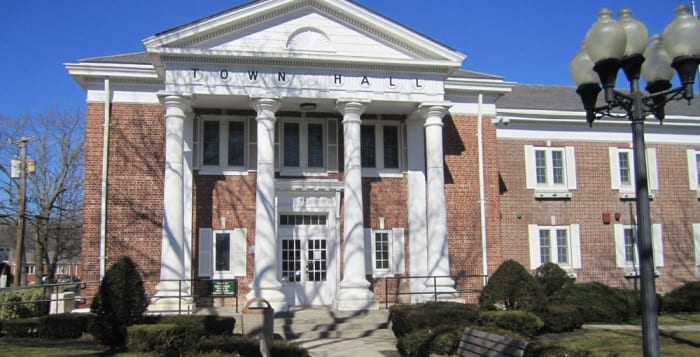Smithtown budget reduces spending
Smithtown’s 2016 preliminary budget proposal called for a small increase in taxes despite some spending cuts, but officials said they anticipated no layoffs because of it.
The $101 million budget, if approved, would reduce the amount of money the town spends by about 3.4 percent when compared to this year’s budget, the preliminary proposal said. An average Smithtown home assessed at $5,500 would see an increase of roughly $18.01 in annual taxes, or $1,271.25 in total, the budget said.
As for the town’s tax levy, the budget pegged it at $55.49 million, which was more than last year’s $55.04 million levy.
In his budget message, Smithtown Supervisor Pat Vecchio (R) said the town was building on an initiative started in 2015 in a five-year capital plan that targets strategic infrastructure upgrades.
“[The budget] substantially moves the town to a structurally balanced budget that does not reduce resident services,” Vecchio said. “It recognizes the initiatives started in 2015 of replacing only essentially needed positions as employees retire or otherwise leave the employ of the town.”
Last year, the town used more than $5 million of surplus funding to balance the budget. But this year, the town was able to use much less than that at $500,000. The use of surplus funding to balance the budget was one of the key reasons Councilmen Bob Creighton (R) and Ed Wehrheim (R) voted against the proposal last year, but both officials told Times Beacon Record Newspapers last week that they were glad to see the town working to end that practice.
In regards to the town’s general fund, Vecchio said taxes increased by $31.62 for the average home without the use of surplus dollars, which he called a change from Smithtown’s past practices. Expenditures went down by nearly $1.1 million, or 2.5 percent, he said.
“The town continues a ‘pay as you go basis’ for repairs and separation pay for retiring workers,” the supervisor said. “Large capital expenditures have been reduced in the operating budget because they have been included in the 2015-19 capital program, which acquires long-term assets through borrowing instead of the use of current operating funds.”
The town was also able to meet the 2 percent tax cap with help from roughly $900,000 in health insurance and workers’ compensation increases, which a decrease in required state pension contributions help address, Town Comptroller Donald Musgnug said. Also included in the budget were longevity and step increases for nearly 30 Smithtown Administrative Guild and 375 Civil Service Employees Association union workers, he said.
Projects in line with the town’s five-year capital budget plan between 2015 and 2019 helped Smithtown save money in the 2016 preliminary budget, officials said, citing various savings that came as a result of them. The town’s LED streetlights project helped save $200,000 in utility costs, and taxes in the outside village fund decreased by $8.80.
The town also allocated savings of about $35,000 in the animal shelter supervisor’s salary to pay for trap, neuter and release services as well as the hiring of a part-time trainer to help train the eight dogs housed at the shelter, town officials said.
On the subject of Highway Department savings, Vecchio said $500,000 of surplus funds there was used to stabilize taxes. Funding was also increased in the town’s snow coffers by $2.14 per household assessed at $5,500 because of severe storms, which he said exhausted funding last year.
The Town Board must adopt the budget by Nov. 20.







